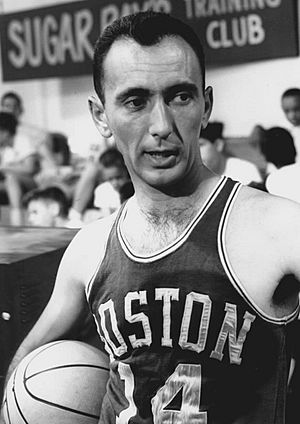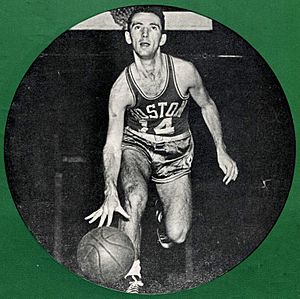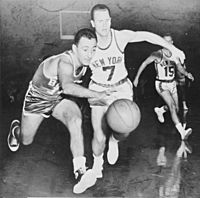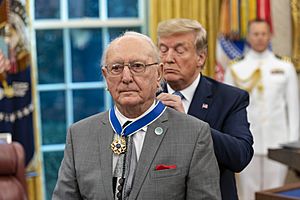Bob Cousy facts for kids

Cousy with the Boston Celtics, c. 1959–1963
|
|
| Personal information | |
|---|---|
| Born | August 9, 1928 New York City, New York, U.S. |
| High school | Andrew Jackson (Queens, New York) |
| Listed height | 6 ft 1 in (1.85 m) |
| Listed weight | 175 lb (79 kg) |
| Career information | |
| College | Holy Cross (1946–1950) |
| NBA Draft | 1950 / Round: 1 / Pick: 3rd overall |
| Selected by the Tri-Cities Blackhawks | |
| Pro career | 1950–1963, 1969–1970 |
| Coaching career | 1963–1973 |
| Career history | |
| As player: | |
| 1950–1963 | Boston Celtics |
| 1969–1970 | Cincinnati Royals |
| As coach: | |
| 1963–1969 | Boston College |
| 1969–1973 | Cincinnati Royals / Kansas City-Omaha Kings |
| Career highlights and awards | |
|
|
| Career NBA statistics | |
| Points | 16,960 (18.4 ppg) |
| Rebounds | 4,786 (5.2 rpg) |
| Assists | 6,955 (7.5 apg) |
Robert Joseph Cousy (/ˈkuːzi/ KOO-zee, born August 9, 1928) is a famous American former professional basketball player. He played as a point guard for the Boston Celtics from 1950 to 1963. He also played briefly for the Cincinnati Royals in the 1969–70 season.
Cousy was a 13-time NBA All-Star and won the NBA Most Valuable Player (MVP) award in 1957. He was a key player for the Celtics, helping them win six NBA championships during his time there. People called him "The Houdini of the Hardwood" because of his amazing ball-handling and passing skills. He led the NBA in assists for eight years in a row. Many consider him the first great point guard in the NBA. He was also the first player to reach 4,000, 5,000, and 6,000 career assists.
Cousy earned a scholarship to the College of the Holy Cross. There, he led the Crusaders to the 1948 and 1950 NCAA Tournaments. He also received NCAA All-American honors for three seasons. After college, he was drafted by the Tri-Cities Blackhawks in the 1950 NBA draft. However, he refused to play for them and was later picked up by the Boston Celtics. After his playing career, he coached college basketball and later became an NBA head coach for the Cincinnati Royals.
In 1971, when he was chosen for the Naismith Memorial Basketball Hall of Fame, the Celtics retired his No. 14 jersey. Cousy was named to the NBA 25th Anniversary Team in 1971, the NBA 35th Anniversary Team in 1981, the NBA 50th Anniversary All-Time Team in 1996, and the NBA 75th Anniversary Team in 2021. This makes him one of only four players to be on all these special teams. He was also the first president of the National Basketball Players Association. In 2019, he received the Presidential Medal of Freedom from President Donald Trump.
Contents
Early Life and Basketball Start
Bob Cousy was born in New York City in 1928. His family moved to St. Albans, Queens, when he was 12. He started playing basketball at age 13 at St. Pascal's elementary school and loved it right away.
When he first tried out for his high school team at Andrew Jackson High School, he didn't make it. But he kept practicing with a local league. The next year, he was cut again.
That same year, he broke his right hand falling out of a tree. This forced him to play with his left hand until his right hand healed. This accident actually helped him become good at using both hands, making him a more skilled player. His high school coach saw him play in a league game and was so impressed that he invited Cousy to try out for the junior varsity team. He made the team and worked hard, eventually joining the varsity team in his junior year.
In his senior year, Cousy was a star. He led his team to the Queens championship and scored more points than any other high school player in New York City. He decided he wanted to go to college and worked on his grades and basketball skills. He chose to attend the College of the Holy Cross in Worcester, Massachusetts, on a basketball scholarship.
College Basketball Career
Bob Cousy joined the Holy Cross Crusaders' basketball team in 1946. His coach, Doggie Julian, used a system where six freshmen, including Cousy, would play as a "second team." Cousy was sometimes frustrated by his limited playing time. His style of play was very different from what was common back then. He used fast, "streetball"-like moves, including behind-the-back dribbling and no-look passes.
In the 1946–47 season, Holy Cross finished with a great record and entered the 1947 NCAA Tournament. They won their games and faced Oklahoma in the championship. Holy Cross won the game 58–47, becoming the first college from New England to win the NCAA tournament.
Even after winning the championship, Cousy's playing time was still limited the next season. He even thought about transferring to another school. However, he decided to stay and continued to improve. He led the team in scoring in his sophomore and junior years, earning All-American honors.
In his senior year (1949–1950), fans loved watching Cousy play. In one game, when Holy Cross was losing, the crowd chanted "We want Cousy!" until the coach put him in. Cousy scored 11 points in a few minutes and hit a game-winning shot. This made him a true team leader. He led Holy Cross to 26 wins in a row and was named a First Team All-American.
Professional Basketball Career
Joining the Boston Celtics (1950–1956)
After college, Bob Cousy entered the 1950 NBA draft. The Boston Celtics had the first pick, and many expected them to choose him. However, coach Red Auerbach picked another player, saying Cousy was too flashy. The Tri-Cities Blackhawks drafted Cousy, but he didn't want to move there. He was then picked by the Chicago Stags, but they closed down. Finally, the Celtics ended up with Cousy, even though their owner, Walter A. Brown, wasn't thrilled at first.
It didn't take long for everyone to change their minds. In his first season (1950–51), Cousy averaged 15.6 points, 6.9 rebounds, and 4.9 assists. He was chosen for his first of 13 straight NBA All-Star teams. The Celtics improved their record, but lost in the playoffs. The next season, with new teammate Bill Sharman, Cousy's numbers got even better, and he was named to the All-NBA First Team.
In the 1952–53 season, Cousy led the league in assists for the first time, averaging 7.7 per game. This was impressive because the NBA didn't have a shot clock yet, which made games slower. In one famous playoff game, Cousy played for 66 minutes in a 4-overtime thriller, scoring 50 points and making 30 free throws. This game is still remembered as one of the best scoring performances ever.
Over the next few years, Cousy became known as one of the best point guards in the league. He led the league in assists for three more seasons and was the MVP of the 1954 NBA All-Star Game. His unique style, with fancy dribbling and "no-look" passes, earned him the nickname "Houdini of the Hardwood." His exciting play brought many fans to the Boston Garden.
Celtics Dynasty Years (1957–1963)
Before the 1956–57 NBA season, the Celtics added two future Hall of Fame players: Tom Heinsohn and defensive star Bill Russell. With these new players, the Celtics became a powerhouse. Cousy averaged 20.6 points and 7.5 assists, winning his first NBA Most Valuable Player Award. The Celtics reached the 1957 NBA Finals and defeated the Hawks 4–3. Cousy finally won his first NBA championship!
Cousy continued to play at a high level, leading the NBA in assists again in the 1957–58 NBA season. The Celtics made it to the 1958 NBA Finals but lost to the Hawks when Bill Russell got injured. This was the last time Cousy would lose an NBA playoff series.
In the 1958–59 NBA season, Cousy led the league in assists again. He even set an NBA record with 28 assists in one game, and a record of 19 assists in a single half, which still stands today. The Celtics swept the Minneapolis Lakers 4–0 in the 1959 NBA Finals, winning another championship.
The Celtics continued their winning streak. They won the 1960 NBA Finals against the Hawks and the 1961 NBA Finals against the Hawks again. Cousy was still a top player, earning All-Star and All-NBA honors.
In his final two seasons, Cousy's scoring numbers started to drop as he got older, but he still contributed greatly. The Celtics won the 1962 NBA Finals and the 1963 NBA Finals, both against the Los Angeles Lakers. Cousy ended his career on a high note, winning his sixth NBA championship. In his last game, he threw the ball into the rafters of the Boston Garden, a memorable moment.
Retirement and Comeback
Bob Cousy retired from basketball on March 17, 1963, in front of a huge crowd at the Boston Garden. This event became known as the "Boston Tear Party" because of how emotional everyone was. Even President John F. Kennedy sent a message praising Cousy's career.
After retiring, Cousy became a coach. He coached at Boston College from 1963 to 1969, where he had a great record of 114 wins and 38 losses. He then returned to the NBA as the coach of the Cincinnati Royals (who later became the Kansas City-Omaha Kings).
During the 1969–70 NBA season, the 41-year-old Cousy, who was coaching the Royals, made a brief comeback as a player for seven games.
NBA Career Statistics
| Legend | |||||
|---|---|---|---|---|---|
| GP | Games played | GS | Games started | MPG | Minutes per game |
| FG% | Field goal percentage | 3P% | 3-point field goal percentage | FT% | Free throw percentage |
| RPG | Rebounds per game | APG | Assists per game | SPG | Steals per game |
| BPG | Blocks per game | PPG | Points per game | Bold | Career high |
Regular season
| Year | Team | GP | MPG | FG% | FT% | RPG | APG | PPG |
|---|---|---|---|---|---|---|---|---|
| 1950–51 | Boston | 69 | — | .352 | .756 | 6.9 | 4.9 | 15.6 |
| 1951–52 | Boston | 66* | 40.6 | .369 | .808 | 6.4 | 6.7 | 21.7 |
| 1952–53 | Boston | 71 | 41.5 | .352 | .816 | 6.3 | 7.7* | 19.8 |
| 1953–54 | Boston | 72 | 39.7 | .385 | .787 | 5.5 | 7.2* | 19.2 |
| 1954–55 | Boston | 71 | 38.7 | .397 | .807 | 6.0 | 7.8* | 21.2 |
| 1955–56 | Boston | 72 | 38.4 | .360 | .844 | 6.8 | 8.9* | 18.8 |
| 1956–57† | Boston | 64 | 36.9 | .378 | .821 | 4.8 | 7.5* | 20.6 |
| 1957–58 | Boston | 65 | 34.2 | .353 | .850 | 5.0 | 7.1* | 18.0 |
| 1958–59† | Boston | 65 | 37.0 | .384 | .855 | 5.5 | 8.6* | 20.0 |
| 1959–60† | Boston | 75 | 34.5 | .384 | .792 | 4.7 | 9.5* | 19.4 |
| 1960–61† | Boston | 76 | 32.5 | .371 | .779 | 4.4 | 7.7 | 18.1 |
| 1961–62† | Boston | 75 | 28.2 | .391 | .754 | 3.5 | 7.8 | 15.7 |
| 1962–63† | Boston | 76 | 26.0 | .397 | .735 | 2.5 | 6.8 | 13.2 |
| 1969–70 | Cincinnati | 7 | 4.9 | .333 | 1.000 | 0.7 | 1.4 | 0.7 |
| Career | 924 | 35.3 | .375 | .803 | 5.2 | 7.5 | 18.4 | |
Playoffs
| Year | Team | GP | MPG | FG% | FT% | RPG | APG | PPG |
|---|---|---|---|---|---|---|---|---|
| 1951 | Boston | 2 | — | .214 | .833 | 7.5 | 6.0 | 14.0 |
| 1952 | Boston | 3 | 46.0 | .400 | .932 | 4.0 | 6.3 | 31.0 |
| 1953 | Boston | 6 | 45.0 | .383 | .836 | 4.2 | 6.2 | 25.5 |
| 1954 | Boston | 6 | 43.3 | .284 | .800 | 5.3 | 6.3 | 21.0 |
| 1955 | Boston | 7 | 42.7 | .381 | .958 | 6.1 | 9.3 | 21.7 |
| 1956 | Boston | 3 | 41.3 | .500 | .920 | 8.0 | 8.7 | 26.3 |
| 1957† | Boston | 10 | 44.0 | .324 | .747 | 6.1 | 9.3 | 20.2 |
| 1958 | Boston | 11 | 41.5 | .342 | .853 | 6.5 | 7.5 | 18.0 |
| 1959† | Boston | 11 | 41.8 | .326 | .745 | 6.9 | 10.8 | 19.5 |
| 1960† | Boston | 13 | 36.0 | .305 | .765 | 3.7 | 8.9 | 15.3 |
| 1961† | Boston | 10 | 33.7 | .340 | .761 | 4.3 | 9.1 | 16.7 |
| 1962† | Boston | 14 | 33.9 | .357 | .684 | 4.6 | 8.8 | 16.0 |
| 1963† | Boston | 13 | 30.2 | .353 | .830 | 2.5 | 8.9 | 14.1 |
| Career | 109 | 38.5 | .342 | .801 | 5.0 | 8.6 | 18.5 | |
Bob Cousy's Legacy
Bob Cousy was a very important player in NBA history. In 1954, he helped create the National Basketball Players Association. This was the first union for players in any of the four major North American professional sports leagues. Cousy was its first president.
In his 13-year NBA career, Cousy scored 16,960 points, had 4,786 rebounds, and 6,955 assists. This means he averaged 18.4 points, 5.2 rebounds, and 7.5 assists per game. He is known as the first great point guard in the NBA. He won eight of the first 11 assist titles in the league. He also won six NBA championships, one MVP award, and was an All-Star 13 times.
Cousy's exciting dribbling and unique passing style made basketball more popular. He helped raise the profile of the Boston Celtics and the entire NBA. Other famous players like Pete Maravich and Magic Johnson later copied his fast-paced style.
To honor his achievements, Cousy was inducted into the Naismith Memorial Basketball Hall of Fame in 1971. In 1963, the Celtics retired his jersey number, 14. Celtics owner Walter Brown said that the Celtics wouldn't be where they are without him. In 2006, ESPN.com ranked Cousy as the fifth-greatest point guard of all time. They said he was "ahead of his time" with his ball-handling and passing.
On November 16, 2008, Holy Cross retired Cousy's college uniform number, 17. His jersey now hangs in the Hart Center rafters, along with other Holy Cross legends.

In 2019, Cousy received the Presidential Medal of Freedom from President Donald Trump. A statue of Cousy was also put up outside the DCU Center in Worcester, Massachusetts, where the Holy Cross basketball team plays. The statue was dedicated in June 2021.
Several basketball awards are named after him. The Bob Cousy Award is given every year since 2004 to the best men's college point guard. In 2022, the NBA renamed its Eastern Conference championship trophy in honor of Cousy.
As of July 2025, Bob Cousy is the oldest living NBA champion.
Off the Court Life
Bob Cousy married his college sweetheart, Missie Ritterbusch, in 1950. They lived in Worcester, Massachusetts, and had two daughters. His wife passed away in 2013.
Cousy was known for standing up against unfair treatment. In 1950, when the Celtics played in a city where people were separated by race, his teammate Chuck Cooper, who was African-American, was not allowed a hotel room. Cousy chose to travel with Cooper on an uncomfortable overnight train instead of staying in the hotel. He also supported Bill Russell, another black Celtics star, who faced unfair treatment.
He was very close to his Celtics coach, Red Auerbach. Cousy was one of the few people allowed to call him "Arnold," which was his real first name.
Cousy also worked as a TV commentator for Celtics games in the 1980s. He even had a small role in the 1994 basketball movie Blue Chips. Today, he works as a marketing consultant for the Celtics and sometimes appears on broadcasts.
Images for kids
-
Cousy receiving the Presidential Medal of Freedom in 2019 from President Donald Trump
-
Cousy speaking at the June 2021 unveiling of a statue in his honor outside of the DCU Center in Worcester, Massachusetts
See also
 In Spanish: Bob Cousy para niños
In Spanish: Bob Cousy para niños
 | Shirley Ann Jackson |
 | Garett Morgan |
 | J. Ernest Wilkins Jr. |
 | Elijah McCoy |







